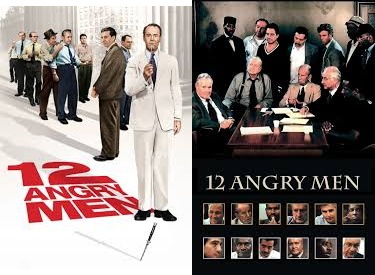I recently watched 1957’s 12 Angry Men with a friend who recommended it. She said, “You don’t expect a movie about twelve guys arguing in a room to be so compelling.” And wow, was she right!
12 Angry Men was directed by Sidney Lumet, with Reginald Rose adapting his own 1954 teleplay. Starring Henry Fonda, the movie focuses on a group of jurors tasked with convicting a teenage boy accused of murdering his father. Moral debates and circumstantial evidence are pondered as each juror’s personal life seeps into their biases for the case.
The movie is a powerhouse of ethical quandaries and sharp characterizations. The personalities of the men clash time and time again, but Fonda stands firm. Can the truth behind their murder case be discovered, or will their preconceived notions win out?
Searching for 12 Angry Men on my Roku revealed a remake had been made in 1997, forty years after the original. After my friend and I finished the film and I bade her farewell, I turned on the remake to see what changes I could find.
From the start, I liked the brief added scene at the very beginning of the movie. While the ‘57 version opens on the courtroom with the judge addressing the jurors, the ‘97 one opens with the sound of the boy screaming “I’ll kill you!” followed by the rumble of the train passing by. I’m such a fan of small additions like this in adaptations.
There are other changes made in the script for the sake of modernity. Monetary prices are adjusted for inflation, the movie title confused by one of the jurors is switched out, and the boy on trial is set to be executed by lethal injection, not the electric chair.
Another updated change I appreciated was the diversity added to the jury. While the 1997 group is still entirely male, four of the jurors are black, one is Mexican, and the Croatian juror from the ‘57 jury is now German.
The tenth juror’s speech/rant near the movie’s end is very racially coded, but those implications are given solid weight in the remake. Pushing the racial angle and changing the tenth juror’s character from someone who can be convinced to back down into someone more stalwart and disconnected is a realistic shift, too. But the power of that scene in the 1957 movie – the imagery of every juror standing up from the table and turning away as the tenth juror grows more and more desperate – isn’t fully delivered in the 1997 one.
And that’s not the only letdown. The different camera angles and the direction of certain scenes make some of the lines lose their impact across 40 years. Two of the strongest lines from the original movie are “How could he be positive about anything?” and “You don’t really mean you’ll kill me, do you?” These are both significant moments in the discussion, as they show the third juror accidentally disproving his own arguments. In the 1997 movie, however, these lines aren’t given the same attention and isolation, losing a great deal of their power.
While it’d be interesting to see another remake of 12 Angry Men (maybe in 40 more years), the exact premise becomes harder to maintain with time. The way we watch movies has changed drastically, making the boy’s alibi even flimsier. It’s easier to remember titles and actor names these days. And with our advancements in technology, would the circumstances of the boy’s arrest remain constant?
12 Angry Men is a masterful movie, and its remake does it justice despite not having quite the same poignancy. A newer adaptation would be enjoyable – I’d be in the theater opening day! – but there wouldn’t be much to be gained from it.
So, with that in mind, we can just go back and rewatch Mr. Monk Gets Jury Duty for that good old-fashioned “convince the jury to change their minds” satisfaction. Perfection is hard to copy, but the attempt can be made!
Ah, Henry Fonda, you’re a marvel. Reginald Rose’s writing isn’t easy to emulate, but it’s stood the test of time for the last seventy years. Let’s wait for the third version in 2037!



